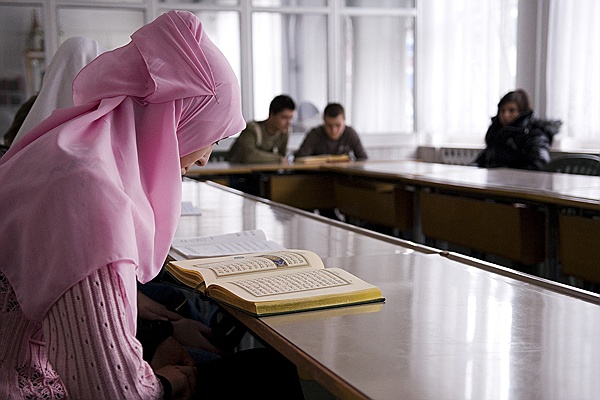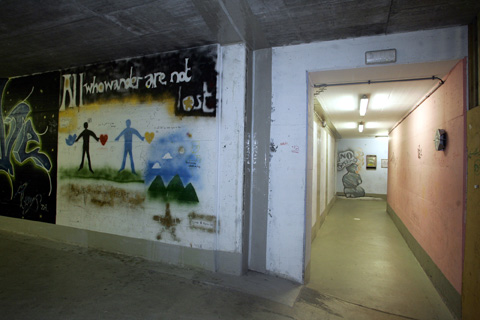Societies racked by fear

Our developed world is prey to all sorts of fears, deliberately stoked by politicians who are eager to present themselves as saviours.
The writer Bernard Comment, who lives in Paris but whose roots are in French-speaking canton Jura, says we must not let ourselves be taken in:
One snowy Christmas Eve in Porrentruy, the little town in the Jura where I was born, I came across a little girl, aged about five or six, who had let go of her mother’s hand in order to stroke lovingly the tangerine which a Father Christmas had thrust into her hand as he scurried past. She sat down on a low wall and said, full of wonder: “He gave it to me! And, you know what? it’s my favourite fruit!”. That little scene in the street sums up the magic of Christmas.
And yet a different feeling immediately contradicts this unreserved happiness that children still know how to experience, in their unquenchable thirst for joy and simple happiness. The end of year festivities have become, at least for a non-believer, no more than an empty ritual, the showy survival of a kind of togetherness which has lost its substance. You have to give presents, and receive them, and play at being pleased and surprised. Old habits die hard, but they have lost their meaning.
We now have not only an economic crisis, but a crisis of meaning as well.
Foreigners vilified
Fear is here to stay. I mean that over the past couple of decades or so we have seen the emergence of societies of fear. The foreigner is the primary source of it: he is the bogeyman invoked to explain insecurity, unemployment, the loss of identity. Savings are another source of fear: huge sums can vanish into thin air in the space of just a few hours, there has been too much theorising in the media about the likelihood of total collapse.
Education, and the public services in general are a source of fear; every citizen is made to feel guilty as it is suggested that it all costs too much, that cuts have to be made, belts must be tightened. Health is a source of fear, with continual reports of pandemics, and intensive care and the emergency services full to bursting. Transport is a source of fear, the weather is a source of fear. Social movements are a source of fear. Tomorrow is a source of fear. In January we are already worrying about flood alerts and the River Seine overflowing the streets of Paris.
If this society of fear has taken root in the so-called developed countries, it is because politicians have been playing a dangerous game, crying wolf in order to present themselves as saviours.
If your frighten people, you will be well placed to reassure them afterwards.
But fear has by now gained so much ground that it can hardly be kept within limits. We now have a climate that is as unpredictable as the weather. The sorcerer’s apprentices are as full of certainties as ever, they batter us with figures, forecasts and conclusions; they boast of their alleged merits, but are no longer believed. Because they have often been wrong. People are afraid.
Lessons of history
What is sad, overwhelmingly depressing even, is to see the worst happening all over again, and the lessons of History apparently not being learnt. Berlusconi isn’t Mussolini, for sure, and castor oil [force fed to Mussolini’s opponents as a kind of torture] is a thing of the past, but is it better? Or is it simply more modern, more technical and media-savvy? It is very striking how government rhetoric about the crisis – particularly the policy of [French President] Sarkozy with its dangerous overtones – has something of Pétain [leader of the collaborationist Vichy government in the Second World War] about it, even if there is more to it than that.
“You have pushed your luck, you have benefited, selfish people have tried to satisfy their thirst for pleasure, morality has crumbled, people have lived beyond their means, and now sacrifices must be made, it’s time to pay, it’s time to expiate your sins.”
The Greeks and the Irish today, the Portuguese and the Spanish tomorrow: it’s always the same tune, played to people who can do nothing about it, and who bear very little responsibility for it, any more than ordinary people did in the 1930s (except through their votes, which – we shouldn’t forget – they used very badly.)
This climate of fear has been spreading for the past two decades. It is usually the creation of rightwing majorities (backed up by media outlets lacking any kind of long term vision). We should be surprised at this political origin. After all, capitalism is basically built on confidence, its strong point is the confidence placed in it by individuals and institutions all of whom, in their own way, have the job of circulating material goods and finance. In other words, liberalism (the very doctrine of capitalism) should be promoting confidence, not fear as it has insisted on doing for too long.
Circle of confidence
We need input from abroad, we need migration flows, and over the years we have always managed to regulate them; we need investment, research, efficient services, training, education, exchange, because we are developed – or so-called “advanced” – societies, and for two centuries we have been carried along by progress, modernity and a belief that tomorrow will be better than today.
And that is what we would like to hear now, to break the vicious circle of the politics of fear and go back to the virtuous circle of confidence. Confidence in other people, confidence in ourselves, confidence in our shared strength.
We have been force-fed with negativity, with alarmism. On the other hand we know to what disasters and abominations proactive policies preaching happiness for everyone have led. Happiness is a matter for the individual, it is private, it is wrong to try to make it a collective business. But confidence is different: that truly is a collective value. I hope to see us once again learning the ambition of living happily together, and building on it, warding off our fears – most notably by laughing at them – and devising our reality rather than passively enduring it.
Then the little girl in Porrentruy will no longer be an exception, or a nostalgic reminder, but an attractive model.
Many Swiss authors have been drawn to live elsewhere in the wide world. Their writings give us a better understanding of unfamiliar places.
swissinfo.ch has invited a number of authors, some well known and some not so well known, to share their observations of their adopted countries.
The opinions expressed by guest author contributors are theirs alone, and do not necessarily reflect the editorial line of swissinfo.ch.
Comment is a Swiss writer, translator and editor born in the French-speaking town of Porrentruy in 1960.
He taught for four years at Pisa University in Italy, before moving to Paris, where he took a research post at the l’Ecole des Hautes Etudes en Sciences Sociales.
He published his first novel, “L’ombre de mémoire” (The Shadow of Memory) in 1990.
He has translated into French several novels by the Italian writer Antonio Tabucchi.
The winner of a number of literary prizes, he has also co-written the screenplays of several films with Swiss film director Alain Tanner.
In 1999 he became fiction editor at the France Culture cultural radio station.
He has been in charge of the Fiction & Co section of the Seuil publishing house since 2004.
He achieved a publishing coup when he was given the rights to the private writings of Marilyn Monroe which appeared simultaneously in several European countries in October 2010.
(Translated from French by Julia Slater)

In compliance with the JTI standards
More: SWI swissinfo.ch certified by the Journalism Trust Initiative















You can find an overview of ongoing debates with our journalists here . Please join us!
If you want to start a conversation about a topic raised in this article or want to report factual errors, email us at english@swissinfo.ch.